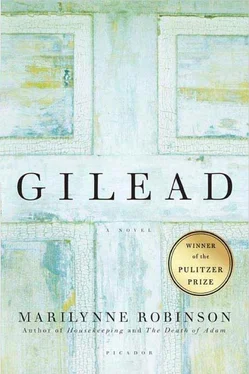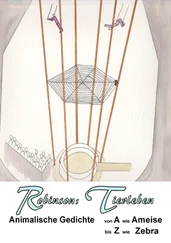I believe that the old man did indeed have far too narrow an idea of what a vision might be. He may, so to speak, have been too dazzled by the great light of his experience to realize that an impressive sun shines on us all. Perhaps that is the one thing I wish to tell you. Sometimes the visionary aspect of any particular day comes to you in the memory of it, or it opens to you over time. For example, whenever I take a child into my arms to be baptized, I am, so to speak, comprehended in the experience more fully, having seen more of life, knowing better what it means to affirm the sacredness of the human creature. I believe there are visions that come to us only in memory, in retrospect. That’s the pulpit speaking, but it’s telling the truth.
***
Today John Ames Boughton paid a call. I was sitting on the porch with the newspaper and your mother was tending her flowers and he just came walking through the gate and up the steps with his hand held out and a smile on his face. He said, “How are you doing, Papa?”—a name he called me in his childhood, because his parents encouraged it, I believe. I have preferred to think so. He had a precocious charm, if that is the word, and it would not have been beyond him to come up with it himself. I have never felt he was fond of me.
It did shock me how much he takes after his father, though of course in everything that matters they’re like night and day. When he introduced himself to your mother as John Ames Boughton, she was visibly surprised, and he laughed. He looked at me and said, “I gather bygones are not bygones yet, Reverend.” What a thing to say! It was an oversight, though, not to have told her such a creature existed, that is, a namesake, a godson, more or less. You were out in the bushes somewhere looking for Soapy, who packs her bags every so often and takes off for parts unknown and worries the life out of you and your mother. You just happened to come around the house then, holding that old cat under the armpits. Her ears were flattened back and her eyes were patiently furious and her tail was twitching. It’s so long you might have stepped on it otherwise. It was clear enough she would bolt if you put her down, but you did and she did and you didn’t seem to notice because you were about to shake hands with John Ames Boughton. “So good to meet you, little brother!” he said, and you were very pleased with that.
I had no idea you and your mother would be so fascinated by his having my name. I’d have warned you otherwise. He came up the steps, hat in hand, smiling as if there were some old joke between us. “You’re looking wonderful, Papa!” he said, and I thought, after so many years, the first words out of his mouth would have to be prevarication, but I was sort of struggling out of the porch swing at the time, which would be no great problem except of course there’s nothing steady about a porch swing to grab on to, and standing up from a seated position is a considerable strain on my heart, the doctor says, and I know from experience how true that is. I thought it best not to die or collapse just there with you two watching, leaving old Boughton to ponder the inevitability of it all, the poor codger. So there was Jack Boughton with that look on his face, lifting me onto my feet by my elbow. And I swear it was as if I had stepped right into a hole, he was so much taller than I than he’d ever been before. Of course I knew I’d been losing some height, but this was downright ridiculous.
It is so strange. One moment I’m a respectable citizen reading up on the political views of Estes Kefauver while his lovely young wife tends her zinnias in the mild morning light and his fine young son comes fondly mishandling that perpetually lost sheep of a cat, Soapy, once more back from perdition for the time being, to what would have been general rejoicing. The flies were bothering a little, but the light was ripe and pure and there was much of interest in the newspaper. Granted I was in my bedroom slippers on account of a little arthritis in my toe. It was pretty nearly a perfect morning.
Then here comes Jack Boughton, who really is the spitting image of his father in terms of physical likeness, with that same black hair and the same high color. He’s just about your mother’s age. I remember when she lifted her dear face to me to be baptized — lifted it into winter morning light, new-snow light — and I thought, She is neither old nor young, and I was somehow amazed by her, and I could hardly bring myself to touch the water to her brow because she looked a good deal more than beautiful. Sadness was a great part of it, it was. So she has grown younger over the years, and that was because of you. But I have never seen her look so young as she did this morning.
Well, the light was fine, and she was in her garden and you were chasing around in your bare feet with your shirt off and freckles all over your shoulders. Your mother had put a piece of hot dog on a string and tied it to a stick for you to use in luring Soapy. She called it your catting pole, which is just the kind of silliness you love, and so you had spent the morning catting in the bushes and around the house while I read up on the election campaign. One of the pleasures of these days is that I notice them all, minute by minute, and this was a fine one, until I found myself being hoisted to my feet by that Jack Boughton. Then I caught a look on your mother’s face and on yours, too, which I know could not have been because of the contrast we made. You didn’t wait till this morning to realize that I am old. I don’t know what it was I saw, and I’m not going to think about it anymore. It didn’t set well with me.
He couldn’t stay for coffee. Things went well enough. Then he was off.
If I live, I’ll vote for Eisenhower.
How I wish you could have known me in my strength.
***
I was speaking of visions. I remember once when I was a young child my father helped to pull down a church that had burned. Lightning struck the steeple, and then the steeple fell into the building. It rained the day we came to pull it down.
The pulpit was left intact, standing there in the rain, but the pews were mostly kindling. There was a lot of praising the Lord that it happened at midnight on a Tuesday. It was a warm day, a warm rain, and there was no real shelter, so everybody ignored it, more or less. All kinds of people came to help. It was like a camp meeting and a picnic. They unhitched the horses, and we younger children lay on an old quilt under the wagon out of the way and talked and played marbles, and watched the older boys and the men clamber over the ruins, searching out Bibles and hymnals. They would sing, we would all sing, “Blessed Jesus” and “The Old Rugged Cross,” and the wind would blow the rain in gusts and the spray would reach us where we were. It was cooler than the rain was. The rain falling on the wagon bed sounded the way it does in an attic eave. It never rains, but I remember that day. And when they had gathered up all the books that were ruined, they made two graves for them, and put the Bibles in one and the hymnals in the other, and then the minister whose church it was — a Baptist, as I recall — said a prayer over them. I was always amazed, watching grownups, at the way they seemed to know what was to be done in any situation, to know what was the decent thing.
The women put the pies and cakes they had brought and the books that could still be used into our wagon and then covered the bed with planks and tarps and lap robes. The food was all pretty damp. No one seems to have thought there might be rain. And harvest was coming, so they’d have been too busy to come back again for a good while. They put that pulpit under a tree and covered it with a horse blanket, and they salvaged whatever they could, which amounted mainly to shingles and nails, and then they pulled down everything that was still standing, to make a bonfire when it all dried out. The ashes turned liquid in the rain and the men who were working in the ruins got entirely black and filthy, till you would hardly know one from another. My father brought me some biscuit that had soot on it from his hands. “Never mind,” he said, “there’s nothing cleaner than ash.” But it affected the taste of that biscuit, which I thought might resemble the bread of affliction, which was often mentioned in those days, though it’s rather forgotten now.
Читать дальше












